英语听课记录(完整版)
英语听课记录(完整版)
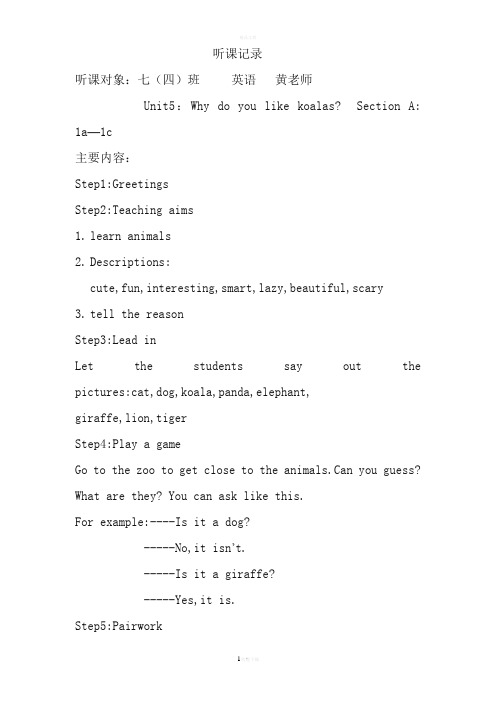
听课记录听课对象:七(四)班英语黄老师Unit5:Why do you like koalas? Section A: 1a—1c主要内容:Step1:GreetingsStep2:Teaching aims1.learn animals2.Descriptions:cute,fun,interesting,smart,lazy,beautiful,scary3.tell the reasonStep3:Lead inLet the students say out the pictures:cat,dog,koala,panda,elephant,giraffe,lion,tigerStep4:Play a gameGo to the zoo to get close to the animals.Can you guess? What are they? You can ask like this.For example:----Is it a dog?-----No,it isn’t.-----Is it a giraffe?-----Yes,it is.Step5:Pairwork(practice the dialogue with the pictures on the blackboard)--What animals do you like?-- I like pandas.-- Why do you like pandas?-- Because they are cute. How about you?-- I like pandas , too.-- Oh , let’s see the pandas first!-- That sounds good!-- OK. Let’s go!Step6:Do 1a(Match and read the dialogue)Step7:Listen 1bStep8:Read 1cStep9:Do the exerciseStep10:Make a conclusion.(Just as the teaching aims)1.Animals2.Descriptions: cute fun interesting smart lazy beautiful scary(a little=kind of very)3. Make a dialogue4. 重点语法:▲ why----because▲let + V原形▲ kind of= a little 有点儿▲ a kind of 一种▲ kinds of 多种多样的Step11:Learn more meaning from this lesson from a piture. (Animals are our friends.We should treat themwell.---“Love animals ,Love ourselves!”)Step12:HomeworkRecite the words in this unit and do the exercise book in period 1.重点与难点:1.重点:The words of animals and descriptions(cute,fun,interesting,smart,lazy,beautiful,scary) 2.难点: Pairwork(practice the dialogue with the pictures on the blackboard 评:这堂课的教学中黄老师用的教法有:1.使用多媒体;2.制作有关动物的卡片;3.用Pairwork的方法来练习对话,从而进一步的掌握动物和描述动物的形容词;4.练习题紧跟,及时巩固本节所学知识点。
小学英语听课记录【三篇】
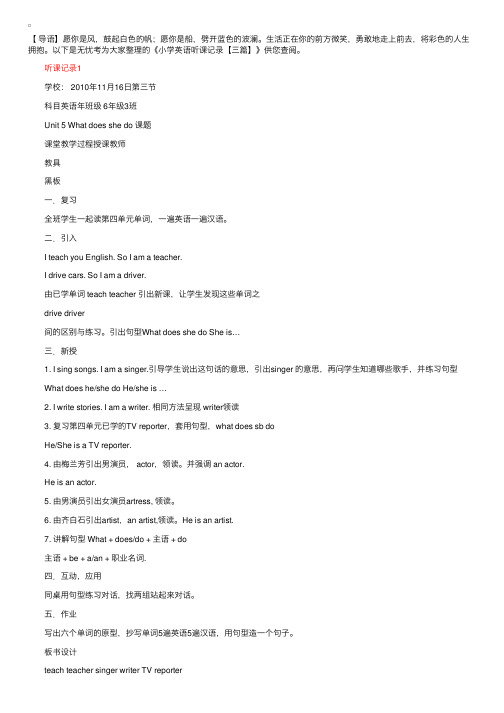
【导语】愿你是风,⿎起⽩⾊的帆;愿你是船,劈开蓝⾊的波澜。
⽣活正在你的前⽅微笑,勇敢地⾛上前去,将彩⾊的⼈⽣拥抱。
以下是⽆忧考为⼤家整理的《⼩学英语听课记录【三篇】》供您查阅。
听课记录1 学校: 2010年11⽉16⽇第三节 科⽬英语年班级 6年级3班 Unit 5 What does she do 课题 课堂教学过程授课教师 教具 ⿊板 ⼀.复习 全班学⽣⼀起读第四单元单词,⼀遍英语⼀遍汉语。
⼆.引⼊ I teach you English. So I am a teacher. I drive cars. So I am a driver. 由已学单词 teach teacher 引出新课,让学⽣发现这些单词之 drive driver 间的区别与练习。
引出句型What does she do She is… 三.新授 1. I sing songs. I am a singer.引导学⽣说出这句话的意思,引出singer 的意思,再问学⽣知道哪些歌⼿,并练习句型 What does he/she do He/she is … 2. I write stories. I am a writer. 相同⽅法呈现 writer领读 3. 复习第四单元已学的TV reporter,套⽤句型,what does sb do He/She is a TV reporter. 4. 由梅兰芳引出男演员, actor,领读。
并强调 an actor. He is an actor. 5. 由男演员引出⼥演员artress, 领读。
6. 由齐⽩⽯引出artist,an artist,领读。
He is an artist. 7. 讲解句型 What + does/do + 主语 + do 主语 + be + a/an + 职业名词. 四.互动,应⽤ 同桌⽤句型练习对话,找两组站起来对话。
五.作业 写出六个单词的原型,抄写单词5遍英语5遍汉语,⽤句型造⼀个句⼦。
PEP人教版小学英语听课记录10篇
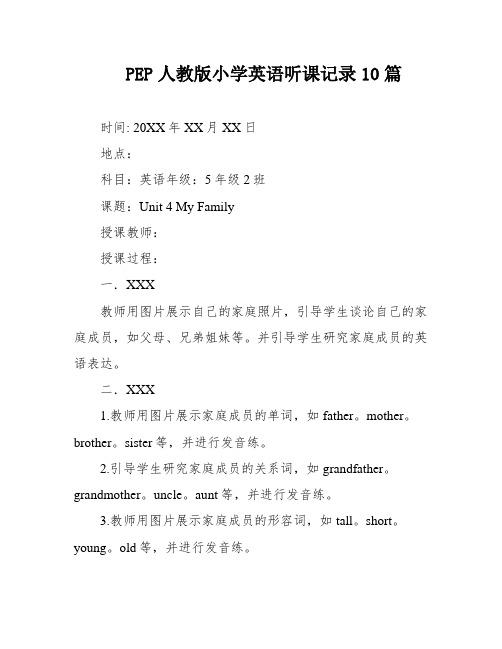
PEP人教版小学英语听课记录10篇时间: 20XX年XX月XX日地点:科目:英语年级:5年级2班课题:Unit 4 My Family授课教师:授课过程:一.XXX教师用图片展示自己的家庭照片,引导学生谈论自己的家庭成员,如父母、兄弟姐妹等。
并引导学生研究家庭成员的英语表达。
二.XXX1.教师用图片展示家庭成员的单词,如father。
mother。
brother。
sister等,并进行发音练。
2.引导学生研究家庭成员的关系词,如grandfather。
grandmother。
uncle。
aunt等,并进行发音练。
3.教师用图片展示家庭成员的形容词,如tall。
short。
young。
old等,并进行发音练。
4.教师用图片展示家庭成员的职业,如teacher。
doctor。
engineer等,并进行发音练。
三.XXX1.教师用图片展示家庭成员的照片,让学生用英语介绍这些人物。
例如,XXX.2.学生分组进行家庭成员介绍比赛,每组介绍完后其他组进行评分。
四.Homework1.完成课本上的练题。
2.写一篇介绍自己家庭成员的短文,使用所学单词和句型。
板书设计Family XXX: father。
XXX。
brother。
sister。
XXX。
grandmother。
uncle。
auntAdjectives: tall。
short。
young。
oldns: XXX。
doctor。
engineerXXX: XXX.时间: 20XX年XX月XX日地点:XXX科目:英语年级:6年级3班课题:Unit 5 What does she do?授课教师:(姓名)授课过程:一.Review老师拿出卡片,让学生复已学动物的名称,并拼读。
二.XXX老师板书mouse。
XXX。
bear。
bird。
squirrel,领读并让学生说出汉语意思。
三.XXX1.老师示范动作,让学生模仿,如:Hunt like a mouse。
Walk like an elephant。
英语听课记录(完整版)
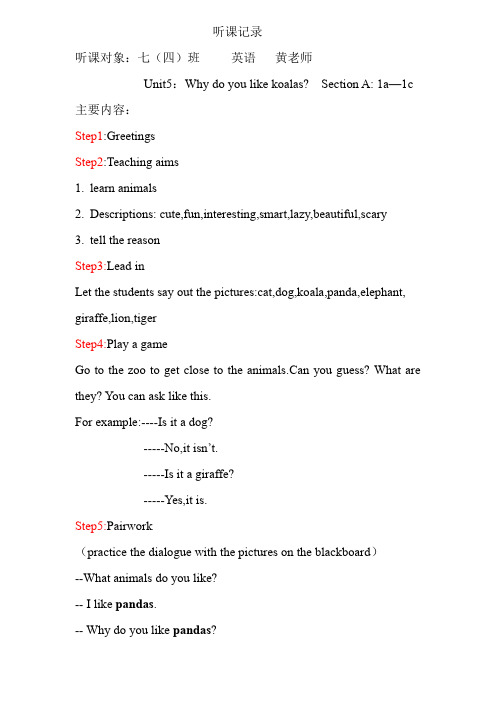
听课记录听课对象:七(四)班英语黄老师Unit5:Why do you like koalas? Section A: 1a—1c 主要内容:Step1:GreetingsStep2:Teaching aims1.learn animals2.Descriptions: cute,fun,interesting,smart,lazy,beautiful,scary3.tell the reasonStep3:Lead inLet the students say out the pictures:cat,dog,koala,panda,elephant, giraffe,lion,tigerStep4:Play a gameGo to the zoo to get close to the animals.Can you guess? What are they? You can ask like this.For example:----Is it a dog?-----No,it isn’t.-----Is it a giraffe?-----Yes,it is.Step5:Pairwork(practice the dialogue with the pictures on the blackboard)--What animals do you like?-- I like pandas.-- Why do you like pandas?-- Because they are cute. How about you?-- I like pandas , too.-- Oh , let’s see the pandas first!-- That sounds good!-- OK. Let’s go!Step6:Do 1a(Match and read the dialogue)Step7:Listen 1bStep8:Read 1cStep9:Do the exerciseStep10:Make a conclusion.(Just as the teaching aims)1.Animals2.Descriptions: cute fun interesting smart lazy beautiful scary(a little=kind of very)3. Make a dialogue4. 重点语法:▲why----because▲let + V原形▲kind of= a little 有点儿▲a kind of 一种▲kinds of 多种多样的Step11:Learn more meaning from this lesson from a piture. (Animals are our friends.We should treat them well.---“Love animals ,Love ourselves!”)Step12:HomeworkRecite the words in this unit and do the exercise book in period 1.重点与难点:1.重点:The words of animals and descriptions(cute,fun,interesting,smart,lazy,beautiful,scary)2.难点:Pairwork(practice the dialogue with the pictures on the blackboard评:这堂课的教学中黄老师用的教法有:1.使用多媒体;2.制作有关动物的卡片;3.用Pairwork的方法来练习对话,从而进一步的掌握动物和描述动物的形容词;4.练习题紧跟,及时巩固本节所学知识点。
完整word版)小学英语听课记录10篇
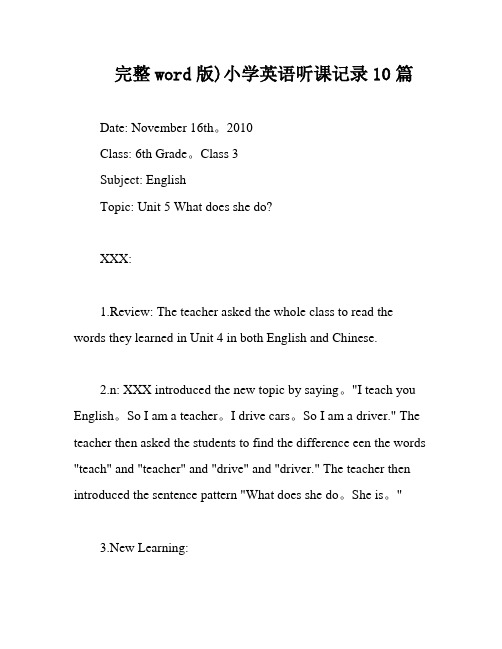
完整word版)小学英语听课记录10篇Date: November 16th。
2010Class: 6th Grade。
Class 3Subject: EnglishTopic: Unit 5 What does she do?XXX:1.Review: The teacher asked the whole class to read the words they learned in Unit 4 in both English and Chinese.2.n: XXX introduced the new topic by saying。
"I teach you English。
So I am a teacher。
I drive cars。
So I am a driver." The teacher then asked the students to find the difference een the words "teach" and "teacher" and "drive" and "driver." The teacher then introduced the sentence pattern "What does she do。
She is。
"3.New Learning:a。
"I sing songs。
I am a singer." The teacher asked the students to XXX word "singer." The teacher then asked the students if they XXX pattern "What does he/she do。
He/she is。
小学英语听课记录(通用6篇)

小学英语听课记录(通用6篇)在教学中,要把导读作为理解课文的主要手段,贯穿于整个教学过程。
以下是为大家整理的关于小学英语听课记录的文章6篇 ,欢迎品鉴!小学英语听课记录篇1 《小学英语对话教学的研究》实验课题实验课听课记录2022年11月21日T:现在老师想问问大家,Whatdoyoulike?你们最喜欢吃什么?T:大家猜猜老师最喜欢什么?T:Ilikehamburgers.T:说到这里,老师都要流口水了。
不过,我们的另外两个好朋友Mike和Sarah 已经迫不及待地要大吃一顿了.出示课件:(A部分的Let`stalk)第一组对话:Ilikehamburgers.Ilikehotdogs.T:Mike喜欢吃 Sarah喜欢吃 Whataboutyou?T:OK,now,readafterit.(读两遍)自主练习。
T:Whatdoyoulike?你喜欢吃什么?指名同学回答。
T:Continue.继续看。
第二组对话:Hereyouare.Hotdogsandhamburgers.T:好了,香喷喷的汉堡包和热狗终于来了,让我们再一次看看服务员阿姨是怎么说的?T:Whocaeadit?Haveatry!T:Ok,让我们一起读。
T:老师也很喜欢.Hotdogsandhamburgers.不过,Mike非常能吃,他觉得汉堡包和热狗还不够,我们看看,他又点了些什么?出示第三组对话:IlikeFrenchfries.Metoo.T:Ok,nowwhocaeadit?Haveatry!找学生试读,教师加以纠正。
T:哪一组愿意读给大家听一听。
Haveatry!找两组同学试读。
T:Ilikehamburgers.如果你也喜欢hamburgers,用同样的方法操练chicken、bread、cake、hotdogs.出示第四组对话:Ok,havesomeFrenchfries.Thankyou.T:好了,现在我们可以张开大嘴,开吃了。
教学实践听课记录英语(3篇)
第1篇一、基本信息课程名称:英语综合课程授课教师:张老师授课班级:高二(1)班授课时间:2023年4月10日星期一上午第二节课听课教师:李老师二、教学目标1. 知识目标:通过本节课的学习,学生能够掌握以下词汇:travel、holiday、culture、attraction、destination。
2. 能力目标:学生能够运用所学词汇进行简单的对话,表达自己的旅行计划和喜好。
3. 情感目标:激发学生对英语学习的兴趣,培养学生热爱旅行的情感。
三、教学过程(一)导入(5分钟)张老师以一幅世界地图作为背景,引导学生观察地图,并提出问题:“同学们,你们想不想去世界上的某个地方旅行呢?”学生纷纷举手回答,课堂气氛活跃。
(二)新课讲解(20分钟)1. 词汇教学:张老师首先板书了本节课需要学习的词汇,并逐一解释了每个词汇的意思。
例如,travel意为“旅行”,holiday意为“假期”,attraction意为“吸引人之处”等。
2. 句型练习:张老师带领学生进行了句型练习,如:“Where do you want to travel?”(你想去哪里旅行?)“I want to travel to Japan.”(我想去日本旅行。
)通过练习,学生掌握了基本的旅行对话句型。
3. 语法讲解:张老师针对旅行话题,讲解了时态和语态的使用。
例如,一般现在时用于描述习惯性动作或一般事实,过去时用于描述过去发生的动作或状态。
(三)课堂活动(15分钟)1. 小组讨论:张老师将学生分成四人一组,要求他们讨论自己假期的旅行计划,并用英语表达出来。
2. 角色扮演:学生分成两组,一组扮演旅行者,另一组扮演导游。
旅行者向导游询问旅行路线、景点等信息,导游用英语回答。
(四)总结与作业布置(5分钟)张老师对本节课的内容进行了总结,并布置了以下作业:1. 请用英语写一篇关于自己假期的旅行计划的短文。
2. 收集五个关于旅行的英语短句,并翻译成中文。
(完整版)八年级英语听课记录
(完整版)八年级英语听课记录第一节:主题-阅读理解技巧主要内容- 讲师介绍了阅读理解的重要性和技巧。
- 分享了一些有效的阅读理解策略,如预测问题、划关键字、注意连词等。
- 提醒学生注意细节、抓住文章的中心思想,并通过实例进行讲解。
- 强调阅读过程中的时间管理和积极思考的重要性。
研究收获- 了解到了一些有助于提高阅读理解能力的技巧和策略。
- 学会了如何在读文章时快速预测问题,以便更好地关注文章细节。
- 意识到了积极思考和集中注意力对阅读理解的重要性。
- 理解到了阅读理解是一项需要不断练和提升的技能。
第二节:主题-写作技巧主要内容- 讲师介绍了写作的基本结构和技巧,如引言、主体段落和结论等。
- 分享了一些有效的写作策略,如提出观点、给出例证、使用合适的过渡词等。
- 强调写作过程中的逻辑思维和清晰表达的重要性,并通过实例进行讲解。
- 提醒学生注意写作时的时间管理和合理组织各段落。
研究收获- 了解到了一些有助于提高写作能力的技巧和策略。
- 学会了如何合理组织文章结构,使其逻辑清晰。
- 理解到了写作中的观点提出和例证给出的重要性。
- 意识到了时间管理和思维清晰表达对写作的重要性。
第三节:主题-口语表达技巧主要内容- 讲师介绍了有效的口语表达技巧,如流利地表达观点、使用恰当的表达方式等。
- 分享了一些提高口语能力的方法,如多听多说、模仿优秀的口语表达等。
- 强调口语表达中的自信和积极思维的重要性,并通过实例进行讲解。
- 提醒学生注意口语练的机会和时间安排。
研究收获- 了解到了一些有助于提高口语表达能力的技巧和策略。
- 学会了如何流利地表达自己的观点,避免口吃和语法错误。
- 意识到了自信和积极思维对口语表达的重要性。
- 理解到了口语表达需要不断练和提升的重要性。
总结这次听课让我收获良多。
通过研究阅读理解技巧、写作技巧和口语表达技巧,我提高了自己的英语能力。
我将会持续练和巩固所学的技巧,以便在英语研究中更加自如和有效地表达自己。
PEP人教版小学英语听课记录10篇
PEP人教版小学英语听课记录10篇小学英语听课记录10篇听课记录1学校:XXX小学时间: 20XX年XX月XX日地点:科目:英语年级: 6年级3班课题:Unit 5 What does she do?授课教师:授课过程:一. Review全班学生一起读第四单元单词,一遍英语一遍汉语。
二. Lead-inI teach you English. So I am a teacher.I drive cars. So I am a driver.由已学单词 teach teacher 引出新课,让学生发现这些单词之drive driver间的区别与练习。
引出句型What does she do? She is…三. Presentation1. I sing songs. I am a singer.引导学生说出这句话的意思,引出singer 的意思,再问学生知道哪些歌手,并练习句型What does he/she do? He/she is …2. I write stories. I am a writer. 相同方法呈现 writer领读3. Review第四单元已学的TV reporter,套用句型,what does she do?He/She is a TV reporter.4. 由梅兰芳引出男演员 actor,领读。
并强调 an actor.He is an actor.5. 由男演员引出女演员actress, 领读。
6. 由齐白石引出artist,an artist,领读。
He is an artist.7. 讲解句型 What + does/do + 主语 + do?主语 + be + a/an + 职业名词.四. Practice and Consolidation同桌用句型练习对话,最好找两组站起来对话。
五. Homework写出六个单词的原型,抄写单词5遍英语5遍汉语,用句型造一个句子。
英语听课记录范文(实用6篇)
英语听课记录范文(实用6篇)(经典版)编制人:__________________审核人:__________________审批人:__________________编制单位:__________________编制时间:____年____月____日序言下载提示:该文档是本店铺精心编制而成的,希望大家下载后,能够帮助大家解决实际问题。
文档下载后可定制修改,请根据实际需要进行调整和使用,谢谢!并且,本店铺为大家提供各种类型的经典范文,如工作总结、工作计划、合同协议、条据文书、策划方案、句子大全、作文大全、诗词歌赋、教案资料、其他范文等等,想了解不同范文格式和写法,敬请关注!Download tips: This document is carefully compiled by this editor. I hope that after you download it, it can help you solve practical problems. The document can be customized and modified after downloading, please adjust and use it according to actual needs, thank you!Moreover, our store provides various types of classic sample essays for everyone, such as work summaries, work plans, contract agreements, doctrinal documents, planning plans, complete sentences, complete compositions, poems, songs, teaching materials, and other sample essays. If you want to learn about different sample formats and writing methods, please stay tuned!英语听课记录范文(实用6篇)英语听课记录范文第1篇五彩缤纷丰收11、秋天的雨香甜好闻(钥匙)传递信息欢乐听课评析这堂课的板书简明扼要地反映了课文的主要资料,脉络清楚,丰收和欢乐两个词语点明了课文的中心,深化了文章的主题。
- 1、下载文档前请自行甄别文档内容的完整性,平台不提供额外的编辑、内容补充、找答案等附加服务。
- 2、"仅部分预览"的文档,不可在线预览部分如存在完整性等问题,可反馈申请退款(可完整预览的文档不适用该条件!)。
- 3、如文档侵犯您的权益,请联系客服反馈,我们会尽快为您处理(人工客服工作时间:9:00-18:30)。
听课记录
听课对象:七(四)班英语黄老师
Unit5:Why do you like koalas? Section A: 1a—1c 主要内容:
Step1:Greetings
Step2:Teaching aims
1.learn animals
2.Descriptions: cute,fun,interesting,smart,lazy,beautiful,scary
3.tell the reason
Step3:Lead in
Let the students say out the pictures:cat,dog,koala,panda,elephant, giraffe,lion,tiger
Step4:Play a game
Go to the zoo to get close to the animals.Can you guess? What are they? You can ask like this.
For example:----Is it a dog?
-----No,it isn’t.
-----Is it a giraffe?
-----Yes,it is.
Step5:Pairwork
(practice the dialogue with the pictures on the blackboard)
--What animals do you like?
-- I like pandas.
-- Why do you like pandas?
-- Because they are cute. How about you?
-- I like pandas , too.
-- Oh , let’s see the pandas first!
-- That sounds good!
-- OK. Let’s go!
Step6:Do 1a(Match and read the dialogue)
Step7:Listen 1b
Step8:Read 1c
Step9:Do the exercise
Step10:Make a conclusion.(Just as the teaching aims)
1.Animals
2.Descriptions: cute fun interesting smart lazy beautiful scary(a little=kind of very)
3. Make a dialogue
4. 重点语法:
▲why----because
▲let + V原形
▲kind of= a little 有点儿
▲a kind of 一种
▲kinds of 多种多样的
Step11:Learn more meaning from this lesson from a piture. (Animals are our friends.We should treat them well.---“Love animals ,Love ourselves!”)
Step12:Homework
Recite the words in this unit and do the exercise book in period 1.
重点与难点:
1.重点:The words of animals and descriptions
(cute,fun,interesting,smart,lazy,beautiful,scary)
2.难点:Pairwork
(practice the dialogue with the pictures on the blackboard
评:这堂课的教学中黄老师用的教法有:1.使用多媒体;2.制作有关动物的卡片;3.用Pairwork的方法来练习对话,从而进一步的掌握动物和描述动物的形容词;4.练习题紧跟,及时巩固本节所学知识点。
优点如下:1.备课认真,准备充分;2.教法新颖,男女生PK始终;3.让学生去教堂前表演Pairwork;4.师生互动、生生互动。
缺点如下:1.针对男女生PK,课尾最好表扬获胜方;2表示动物的形容词操练不足;3.容量优点大,需要删减;4.老师有点拘谨,紧张,需放开点。
